“We cry because we cannot sell“ – Restricted mobility in the wake of the Covid-19 pandemic
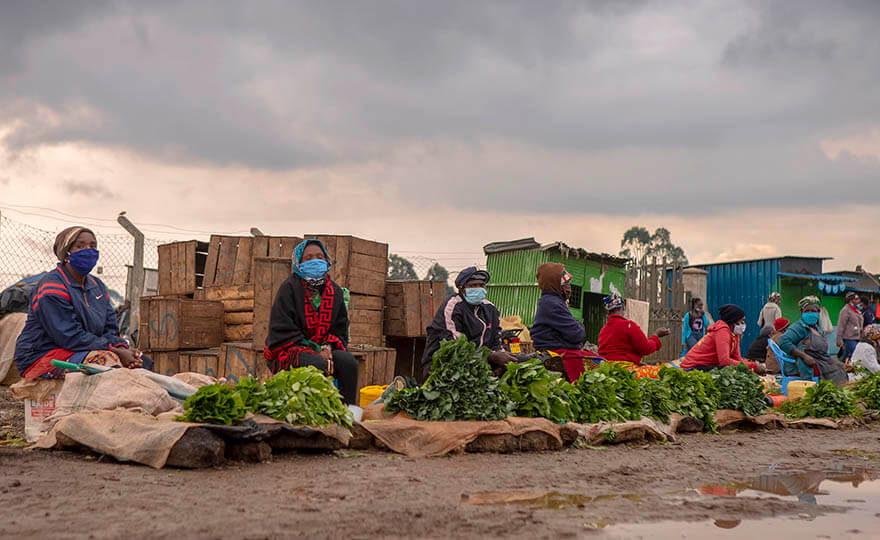
Social distancing in the market. April 2020, Kenya. Photo: World Bank / Sambrian Mbaabu.
Maria in the Angolan countryside cannot get her produce to market. Gideon in Lagos had to let his recycling workers go. Dorothy in Lusaka has been called a fraudster by unhappy customers. And Fridah in Nairobi cannot complete her teaching degree.
All over the African continent, peoples’ lives and livelihoods have been affected by the restrictions imposed by governments to reduce the spread of the virus.
What are the consequences in the short term? And what could be the repercussions in the longer term? NAI researchers share reflections and recommendations for the way forward.
Covid-19 and the informal economy
"Covid-19 is a most mobile phenomenon. It rivals the movement of capital and capitalism as a whole. When you look at how rapidly it moves around, there are no secret places for it. It crosses physical borders, social borders, in fascinating ways”, says Francis Nyamnjoh, professor of anthropology at the University of Cape Town.
Sub-Saharan Africa confirmed its first Covid-19 case in Nigeria on 27 February 2020, when an Italian citizen in Lagos tested positive for the virus. Most African countries took quick action to stop the virus from spreading through lockdowns, curfews and other restrictions. In Zambia the government announced the closure of all schools, universities and colleges on 17 March, before the country had any confirmed cases of Covid-19.
In Angola, the parliament declared a state of emergency on 27 March, at a time when the country had only three confirmed cases of the virus. Many African nations were also fast in their decisions to start easing restrictions. In Ghana, lockdown was partially lifted on 20 April in the two biggest cities, Accra and Kumasi, after only three weeks.
While restrictions on mobility will affect everyone in society, those who make a living in the informal economy are particularly vulnerable.
More than seven out of every ten people on the African continent are part of the so-called informal workforce, according to the International Labour Organization (ILO). They are traders, in cities and across borders; they are migrant labourers in agriculture. That means they do not have contracts that ensure they have an income even if they are forced to stay at home.
Nyamnjoh says that while restrictions on mobility will affect everyone in society, those who make a living in the informal economy are particularly vulnerable.
“The challenges are enormous at various levels, but more acute for those who originally were already living very precarious lives, and then having to cope with that blanket closure of borders and prolonged social and economic lockdown with little or nothing to fall back on”, Nyamnjoh says.
NAI researcher Jesper Bjarnesen stresses that this crisis has uncovered and reinforced existing inequalities in society and that vulnerable groups are already feeling the economic shock more. It actually gives further advantages to wealthy elites who can easily distance themselves from everyone else.
“In one sense, social distancing has been the fashion for some time in Africa. Elites have been hiding away in gated communities because they feel safe there. Now, the corona-crisis is further legitimising the segregation of people”, Bjarnesen adds.
NAI researcher Cristina Udelsmann Rodrigues, an anthropologist, says that only a privileged few have the luxury of staying at home and keeping their distance from others.
“Poor people need to move to survive”, Udelsmann Rodrigues points out. However, she also admits that African governments have few options other than lockdowns and curfews.
“The underlying problems are too big. There is no way to resolve issues that worsen the contagion from one day to another, such as poor housing, packed transport or informal unprotected livelihoods. What they can do is to act firmly and close down society, even though it might not help – and even make things worse – for many”, Udelsmann Rodrigues says.
Families at risk when markets close down

Sandra Mukavele, Maria Rosa, Sonia Manuel.
In the Xiquelene informal market in Mozambique’s capital Maputo, Sandra Mukavele makes her daily living from selling vegetables. Early every morning she takes a minibus taxi to a wholesale market outside of the city to buy vegetables and then takes another minibus into the city to her place at the market. Seven people at home depend on her earnings. But since the outbreak, clients have been buying less from her. Also, she is not allowed to stay at the market as long as she was before the virus.
“At 3pm, the municipal police come and order us to shut down and go home. Before, l worked until half-past seven, because it´s in the evening most customers come by. My family waits for me to come home and cook, but I haven’t sold enough and don’t have money to buy groceries”, Mukavele says
In downtown Maputo, at another marketplace, Sonia Manuel is selling fresh fish. Before the coronavirus outbreak, she sold around 20 to 30 kilos a day. Today, she has only sold five kilos, and soon she will have to pack up and leave due to the new regulations.
“This is how l make my living and it doesn’t make sense that the authorities send me home early. If this lasts another month, we are not going to survive”.
“Thank God the schools are closed. Otherwise I would have had many other costs — textbooks, school fees and transport for the kids, which would have been impossible for me to pay, Manuel adds.
Poor people need to move to survive.
Although the informal sector is small in terms of GDP contribution it is the main source of employment in many African countries, explains Jörgen Levin, development economist at NAI. Through direct support for informal or family-run businesses, governments can temporarily protect their earnings. The catch is that states often lack the resources and proper instruments to implement such programmes.
“It is difficult to target businesses which are typically not registered at the tax authority”, Levin explains.
An alternative way, already in practice in a number of countries, is to scale up cash transfer programmes targeted directly to poor and vulnerable households. However, that does not reach all households and small business owners.
A quicker and more effective way to help workers back on their feet would be to simply remove restrictions on people’s mobility and economic activity, according to Levin.
“Then again, that would have to be measured against the risk of increased spread of Covid-19”, he says.
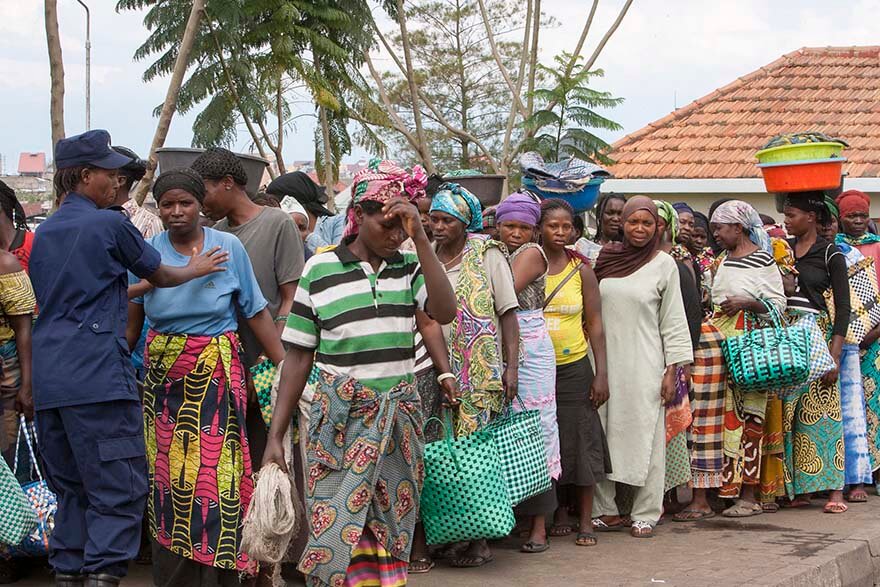
Women in Rwanda's Rubavu district at the DR Congo border before the outbreak of Covid-19. Female cross border traders are particularly vulnerable to lockdowns and movement restrictions. Photo: Simone D. McCourtie / World Bank.
In both Angola and Mozambique, as in many other African countries, a constant flow of products between cities and rural areas is completely necessary, Udelsmann Rodrigues says. “Meat and vegetables are transported to town while manufactured products go in the other direction. Coronavirus restrictions have dissolved many networks making these exchanges happen”.
Maria Rosa is a small-scale farmer living in a village some 120 kilometres outside of Lubango in central Angola. Her family live off what they produce in the fields. But in order to get money to buy cooking oil, soap, flour and other necessities Rosa needs to sell small quantities of agricultural products at the market. Now the market is closed.
“I understand why the government issued state of emergency to prevent transmission of the virus, and l do not want to bring corona home to my family. But, at the same time, we cry because we cannot go to the market and sell”, Rosa says.
According to NAI gender researcher Diana Højlund Madsen, women are particularly vulnerable to lockdowns and movement restrictions. To a higher degree than men, they are involved in informal sectors that require working outside of the home and being in close contact with customers on streets and marketplaces.
“If they stay at home they don’t sell anything, which puts food security for the family at risk. However, if they go to the market they risk being infected. And if they get sick from Covid-19, they cannot work and food security is still at risk. It is definitely a dilemma”.
Many of the economic stimulus packages adopted by African countries are oriented towards the formal sector. Rwanda was the first African country to get support from IMF (International Monetary Fund) to remedy the negative economic effects of the Covid-19 pandemic. Related to this, a national economic recovery plan has recently been launched for the period from May 2020 to December 2021. The plan does not focus on traders, nor does it include a gender perspective.
“There is a need for feminist leadership and gender mainstreaming in national economic responses towards Covid-19”, Højlund Madsen adds.
The Covid-19 crisis has also affected cross-border trade, as female traders from the neighbouring Democratic Republic of Congo cannot cross the closed borders to Rwanda, leading to a loss of earnings and food insecurity.
Production decline and trade disruptions

Kader Bazie, Dorothy Sakala.
In Zambia’s capital Lusaka, Dorothy Sakala makes a living from importing goods from South Africa and Tanzania. In March she ordered fish descalers – tool used for removing scales from fish – from South Africa, a product which she describes as “the in-thing”.
“Based on demand, I was thinking, ‘Oh, this is a good deal for me’. I had a container, enough stock”.
However, her troubles began when the truck driver she had hired in South Africa crossed the border from Zimbabwe to Zambia. The driver was quarantined for two weeks.
Soon, customers started to accuse her of fraud and demanded their money back.
Sakala would normally use the money she gets from customers to pay for new orders. Now she has to take money out of her own pocket, the little savings she has, to refund unhappy customers.
“It used be smooth sailing. I would keep deadlines”, she says. Now, however, the restrictions imposed to stop Covid-19 have made it virtually impossible to set a time frame for deliveries.
The disruptions often affect a whole chain of buyers. Sakala’s customers typically buy in bulk and resell to other buyers.
Now Sakala is stuck with goods she cannot sell. Monthly sales are down from 3,000 kwacha to between 600 and 800 kwacha.
The Covid-19 pandemic has also made people more cautious, she explains, with some worrying that imported goods may themselves be carrying the virus.
“I feel discouraged, but then what do I do? I need to sell. We have children, we have a life after this pandemic”.
“Zambia’s small- and medium-scale traders, many of them women, are the biggest losers when cross-border traffic is affected by restrictions”, says NAI researcher Patience Mususa.
As a completely landlocked country, Zambia urgently needs trade routes with neighbouring states to stay open. So, to protect key national industries, borders were kept open for large-scale businesses, but closed for small- and medium-scale traders.
But closing the border for the smaller businesses also had practical reasons.
“The volume of traders going back and forth across borders is huge. With the scale of operations needed to test people, get their contact details and quarantine those who are sick – that is hugely costly. There just isn’t enough capacity”, Mususa says.
Dorothy Sakala was caught in the middle.
Economies that depend on natural resources or tourism have generally been more damaged than others in the crisis.
Trade disruptions, within or between countries, entail great costs, explains Levin.
When shocks hit an economy, they often lead to a series of repercussions throughout society, Levin says, as in the case of Sakala, whose disrupted imports affected a chain of resellers.
The Zambian economy, built around the copper mining industry, has been hit hard by falling commodity prices since the beginning of the pandemic.
“Economies that depend on natural resources or tourism have generally been more damaged than others in the crisis. Countries with diversified economies have fared better”, Levin says.
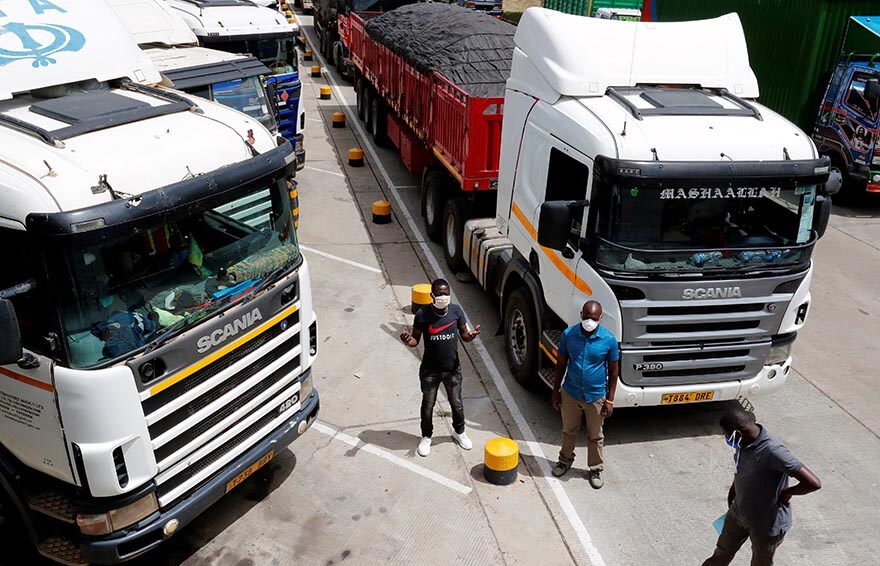
Truck drivers amid the spread of the Covid-19 outbreak at the Namanga one stop border crossing point between Kenya and Tanzania, May 12, 2020. Photo: Reuters/Thomas Mukoya.
In the wake of the pandemic, production in some sectors has fallen sharply due to restrictions and increased economic uncertainty.
In the city of Bobo-Dioulasso, in south-west Burkina Faso, Kader Bazié earned a living as a construction worker doing short-term jobs at sites in and around the city. Now, he mostly sits at home waiting for the phone to ring.
The government in Burkina Faso initially adopted strict containment measures, including imposing a nationwide curfew, shutting down schools and universities, closing the borders, quarantining affected cities and mandating the nationwide use of masks. As the number of new daily cases declined in late April and early May, the authorities began to ease some social and economic restrictions.
The economy, however, does not seem to have recovered since the lockdown.
“There is hardly any money circulating. Everything has stalled”, Bazié says.
Before the pandemic, Bazié would get frequent phone calls from builders. He would then go to a given construction site to negotiate the terms for the job. Things were going well. Shortly before the outbreak, he had even bought machinery for cutting down trees, to add more skills to his resume.
Now the phone is mostly quiet. Bazié says that he has also become more cautious. A while ago, he was contacted by a builder who asked him to work at a construction site outside the city. However, Bazié turned down the offer.
“As workers, we would sometimes get cheated even before the pandemic. We would do the work and then be told that there was no money left. Now, with the corona, companies will have even less money to pay for work”.
When restrictions affect companies, staff bear consequences

Aduragbemi Fasakin, Gideon Fakolade, Olumuyiwa Adegun.
Gideon Fakolade is an entrepreneur facing difficulties. He runs a recycling company in Lagos, Nigeria, which collects plastic bottles and aluminium cans to make sand-based roof and pavement tiles. He mainly gets the recyclables from restaurants or from contracted waste pickers.
“Restaurants are closed and the curfew prevents waste pickers from working in the streets. I have had no other option than to let some of the field workers go. They are in the informal sector and have nothing else to rely on, no grants or subsidies from the state, nothing”, Fakolade remarks.
It is a collective responsibility for us to stay healthy so we can continue to produce.
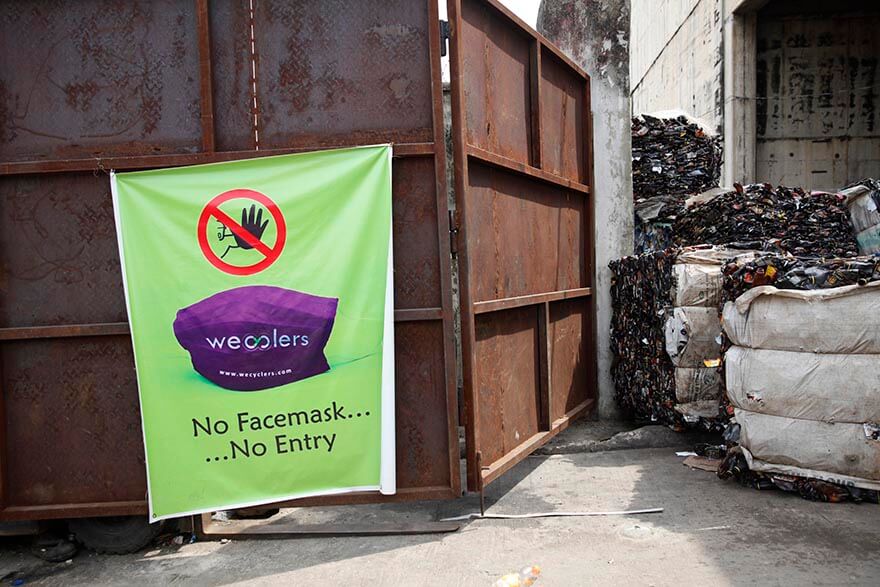
The entrance of a recycling and waste management hub in the Lagos, Nigeria 5 June 2020. TT/Akintunde Akinleye.
Four hours’ drive outside of Lagos, Aduragbemi Fasakin has an enterprise specialising in organic products. His company was badly affected when restrictions were imposed following the coronavirus outbreak.
“The workers could not come to my farm. If they don’t work nothing is produced — they don’t get paid and l don’t make a sale. That is why l have built mini-accommodations on the premises, so the staff don’t have to travel back and forth, keeping them safe from the virus. It is a collective responsibility for us to stay healthy, so we can continue to produce”, Fasakin says.
Former NAI guest researcher Olumuyiwa Adegun says that in the beginning people in Nigeria were cautious and afraid of being infected, which meant they observed the restrictions. However, after a time the economic consequences kicked in, forcing people to go out and earn money again.
“We are only human and the first priority is to feed ourselves. The government realised it, too, and gradually opened up society”, Adegun notes.
His own workplace, the Federal University of Technology in Akure, is completely closed, though, and is not providing online classes for students.
“My university has very big classes and does not have an established platform for home-learning. It is not something that is easy to put in place. We would also need to buy 5,000 laptops and send them to the students’ homes. Maybe we can do that someday, but we are not there now”, Adegun explains.
Distance learning – an option only for the few
Kenyan student Fridah Karanja was supposed to be graduating in July, with a degree in education from Nairobi’s Kenyatta University. However, because of the pandemic, the university is now closed and graduation has been postponed.
“In order to graduate, you need to take the final exam, and this won’t happen until the university opens again”, she says.
Students are given assignments, which are posted on an internet platform set up by the university. Lecturers and students communicate via email and chat forums.
“There is still something to follow. Every week they post assignments for you to do”, Karanja says.
The university council took the decision early in the crisis not to give lectures via Zoom. The argument was that many students, especially those from rural areas, would be unable to follow the curriculum.
“Some of my friends don’t have internet access and even fewer own a laptop”, Karanja says.

Claudia Dentu.
However, Ghanaian business administration student Claudia Dentu is following the curriculum at Accra’s Ashesi University via Zoom.
Facing the threat of Covid-19, her institution spent two weeks moving the whole curriculum online.
“It’s like nothing really changed about the curriculum. We carried everything back home with us. We are online”, she says.
The university is giving each student 25 GB of free data to support their move to digital teaching.
Dentu says that while many of her classmates complain about having to do household chores or being disturbed by crying babies, the majority are now following the curriculum online.
Higher education should be a vehicle that creates opportunities for upward mobility for underprivileged people, NAI researcher Henning Melber points out. But with lockdowns, and teaching shifted towards distance learning, which requires modern technology and a reliable power supply, the class-based nature of society and education is instead being reinforced.
“The already privileged middle- and upper-class strata remain the main beneficiaries. While the less privileged are handicapped if not completely excluded”, Melber says.
A window for policy re-thinking
In mid-May, several African countries lifted some restrictions and opened up their societies again, as in other parts of the world. Was it too early or were lockdowns too much in the first place? Only time will tell. However, donors in the global North and other partners with Africa have already started to talk about building back better.
One-size-fits-all-measures, blind to social structures and local economy dynamics, are unlikely to benefit African societies.
According to NAI researcher Jesper Bjarnesen, the need to please donors in the global North could be one reason why many African leaders have copy-pasted European or other foreign measures to address the Covid-19 crisis. In his view, one-size-fits-all-measures, blind to social structures and local economy dynamics, are unlikely to benefit African societies.
“For example, the notion of ‘flattening the curve’ of Covid-19 infections relates directly to the capacity of a national health care system to treat the most severe cases. In many African countries, however, advanced emergency treatments such as ventilators are only available to the elite”, Bjarnesen says. “And work-from-home policies are also dependent on an economy in which people can actually do their work from home, or where there are services in place to offer financial and other support during lockdown”.
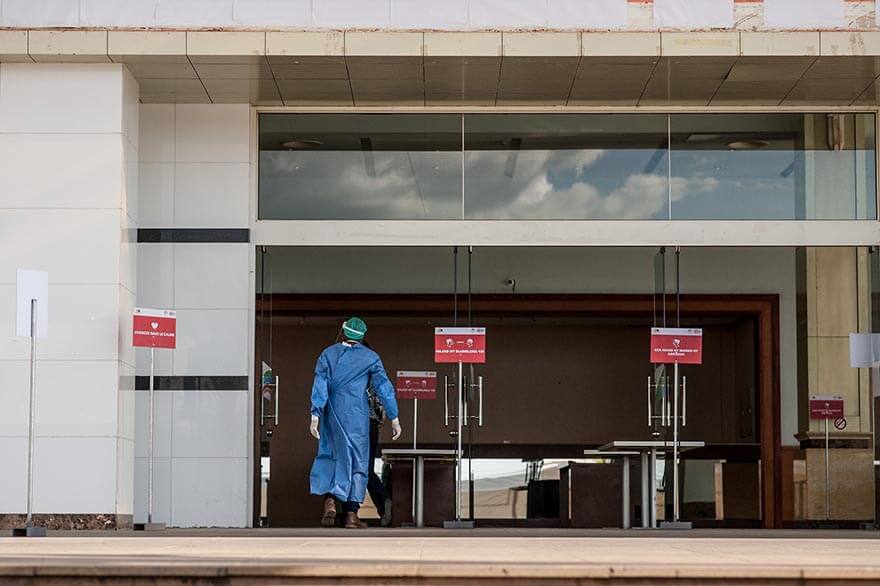
Covid-19 testing in Madagascar, March 31, 2020. Photo: World Bank / Henitsoa Rafalia.
At country and household levels, it is clear that those with ‘insurance’ are much less affected by the crisis, Levin points out. He mentions Botswana, where an extensive fiscal stimulus package put in place during the Covid-19 crisis, was partly financed by the government’s wealth fund. Other resource-rich African states had an opportunity to accumulate savings in the period from 2000 to 2013 when commodity prices were high.
At the household level, however, it is crucial to scale up the social protection programmes in place, according to Levin. He argues that the Covid-19 crisis presents an opportunity to design programmes to incentivise informal businesses to register with tax authorities, thus making them formal. These reforms should be coordinated with other social protection programmes, he says.
“There is no quick fix, but Nordic countries and other development partners can support a policy dialogue on how to build resilience to future pandemics and other shocks. A policy dialogue on Africa’s future development agenda needs to not only re-establish momentum on the Sustainable Development Goals, but also focus on long-term development as outlined in the African Union’s Vision 2063, ‘The Future We Want’”, Levin says.
Francis Nyamnjoh also thinks the crisis has opened a window to re-think policy.
“What is the bigger picture here, what lessons can we learn, globally speaking? And how can we begin to implement them, conscious of the fact that the very inequalities that Covid-19 took advantage of persist after it has ended?”
The voices here confirm that the long-term effects of the corona-crisis are likely to be felt most by those who were already in vulnerable positions. Also, state responses to the global pandemic pose serious challenges to the livelihoods of people who depend on everyday mobility. At the same time, Bjarnesen emphasises, many people have been resilient and resourceful in adapting to these difficult circumstances.
“Even the most marginalised are able to respond to new challenges and provide solutions and innovation for their own predicaments. State- and donor-driven policies should harness this resourcefulness and dynamism, by taking stock of the needs and conditions on the ground, and working to facilitate people’s movements, rather than relying on across-the-board restrictive measures, which are unlikely to work”.
Text: Johan Sävström and Mattias Sköld
Online resources regarding Covid-19 in Africa
- AllAfrica coronavirus related news in English
 External link, opens in new window.
External link, opens in new window. - AllAfrica coronavirus related news in French
 External link, opens in new window.
External link, opens in new window. - Corona Times - Interdisciplinary blog written and curated by scholars around the world
 External link, opens in new window.
External link, opens in new window. - ASC Leiden - blogs about the spread of COVID-19 through Africa, and the impact of the pandemic
 External link, opens in new window.
External link, opens in new window. - Corona Brief Africa, blog about corona in Africa from The Friedrich Ebert Stiftung
 External link, opens in new window.
External link, opens in new window. - Blogs from The London School of Economics and Political Science
 External link, opens in new window.
External link, opens in new window.
